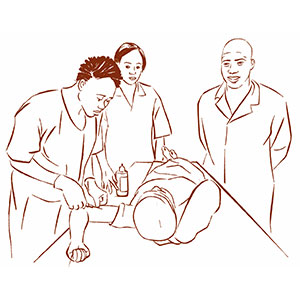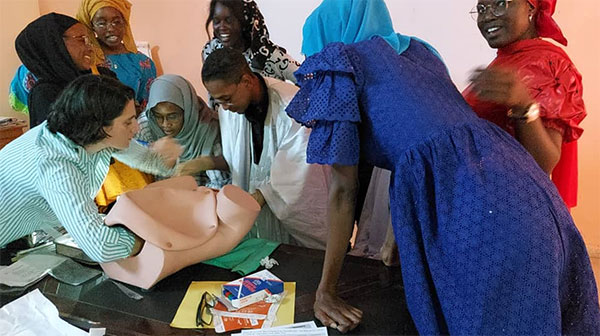Strengthening health human resources

In the countries where we operate, the healthcare systems face major obstacles:
• Shortage of qualified professionals, particularly in rural or isolated areas.
• Precarious working conditions that encourage the migration of talent.
• Limited opportunities for continuing education and professional support.
Since its creation, Santé Sud has been built around the concept of ‘Acting together without replacing’. Our role has always been to support, without replacing, the players in the healthcare system in the reception and care of patients, particularly in primary healthcare.
France’s global health strategy aims to strengthen human resources for health by supporting the initial and ongoing training of health professionals, in particular through partnerships with training establishments in partner countries. It also encourages the improvement of policies for the management of human resources for health, including the retention, redistribution and development of skills, in order to respond sustainably to the needs of local health systems.
Santé Sud supports healthcare professionals in setting up healthcare services that are accessible to all, without discrimination.
Our challenges and our commitment
At Santé Sud, we believe that access to quality healthcare starts with the development of competent, motivated and accessible human resources in health. Faced with the growing challenges facing healthcare systems in many countries, we are taking action to strengthen human resources in health, an essential pillar of a sustainable and equitable healthcare system.
We support medical and healthcare teams, as well as administrative and management staff, in improving their skills, with the aim of providing appropriate, high-quality care.
“Santé Sud’s training has given us the tools we need to cope with our first job. Now I have more confidence in dealing with patients. What’s more, we’ve had companionships. It’s a source of motivation because we know that we’re not abandoned or neglected in our remote area.”
Olivia, midwife and community worker trained by Santé Sud in Madagascar in 2022
Training for healthcare professionals∙les is embedded in local contexts, taking into account the specific needs of healthcare structures and the rights of populations.
In particular, Santé Sud raises awareness among medical and nursing staff of gender stereotypes and, more generally, of all the vulnerability factors linked to healthcare, and of the biases that can affect their care of patients through ongoing training programmes.
By increasing healthcare professionals’ knowledge of gender dynamics, Santé Sud is helping to create safe, non-stigmatising care environments.
Strengthening civil society to support local communities and advocate for health-friendly environments
Our projects are co-constructed with our partners on the basis of a shared diagnosis of the local situation. They are implemented through a process of transmission, mentoring and exchanges of expertise, with responsibility for the actions implemented being shared.
By supporting them in their activities and strengthening their capacities, Santé Sud works to ensure that civil society players make an active contribution to tackling health issues.
As part of the SentinElles project, Santé Sud is working in partnership with the LDDF-INJAD network in Morocco. Thanks to their complementarity, the LDDF-INJAD network has developed its expertise in sexual and reproductive health and rights, psychosocial issues and has been strengthened in its structure.
Thanks to the Network, Santé Sud has increased its knowledge of gender-based violence, particularly in the Moroccan context. This partnership is a source of mutual enrichment.
Our approach to strengthening human resources in healthcare facilities
Thanks to a pragmatic and collaborative approach, our initiatives include :
Initial and ongoing training
We organise training sessions tailored to local needs. These programmes include, for example
- The management of medical emergencies in isolated areas (and in the absence of technical facilities),
- Care for pregnant women and young children, with a view to the first 1,000 days,
- Primary healthcare for rural communities,
- Specialisation in family and community medicine.
Support and supervision
We work directly with healthcare teams at all levels of the healthcare pyramid, in the field, to strengthen their skills:
- Coaching for management teams, department heads or care managers,
- Practical workshops in hospital and community settings,
- Sharing international recommendations and best practice
- Monitoring the development of skills and practices and supporting their continuous improvement, in alliance with managers.
